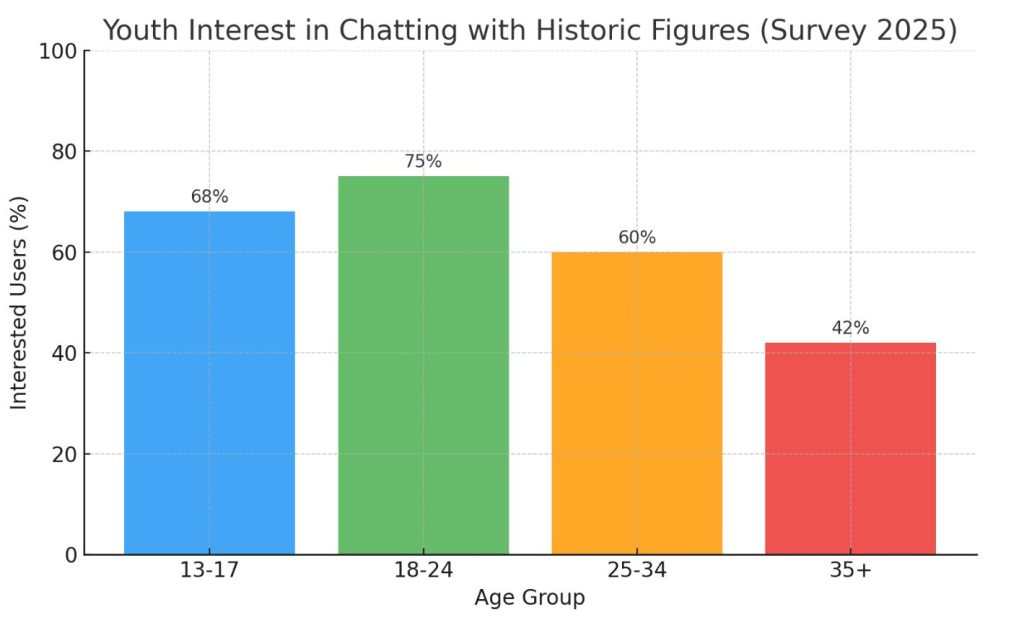Introduction
Imagine talking to people like Albert Einstein, Cleopatra, or Martin Luther King Jr. — not just reading about them in books, but actually having a conversation. It may sound like science fiction, but it is real now. Thanks to AI, there is a tool called Historic Mentor that lets you chat with famous people from history.
Young people everywhere are excited about this new kind of learning. It is not boring like old textbooks. It feels more like time travel — but with chat.
What Is Historic Mentor?
Historic Mentor is an AI platform. It uses smart technology to simulate (copy) the speaking style, ideas, and answers of famous people from the past. It collects information from history books, letters, speeches, and trusted sources. Then it uses AI to create a chatbot version of each figure.
Examples of Who You Can Chat With:
| Historic Figure | Topic You Can Ask About |
|---|---|
| Albert Einstein | Physics, imagination, thinking |
| Marie Curie | Science, discovery, women in STEM |
| Leonardo da Vinci | Art, invention, curiosity |
| Nelson Mandela | Peace, equality, justice |
| William Shakespeare | Literature, storytelling |
| Cleopatra | Leadership, ancient Egypt |
More historical figures are added all the time. It works like ChatGPT, but with the mind of someone from history.
Why Young People Like It?
A recent 2025 online survey asked 4,000 young users what they think of tools like Historic Mentor.
Look at this chart 👇

Key Results:
- 75% of people aged 18–24 are very interested.
- Teenagers (13–17) also showed 68% interest.
- Older users (35+) are less excited (42%).
So clearly, youth are leading this new way of learning.
What Makes It Special?
Historic Mentor is not like reading Wikipedia. It feels more alive.
- You can ask deep questions, like “Einstein, how did you feel when you left Germany?”
- You can ask for advice, like “Shakespeare, how do I write a powerful poem?”
- You can even explore opposing views, like asking both Churchill and Gandhi about war and peace.
The AI gives answers in the style of that person, using words they really used in history.
Is It Accurate?
That is a good question. The makers of Historic Mentor say the system only uses trusted sources, like academic books, speeches, and real letters. But still — it is not 100% perfect.
The AI is trained to say, “I may not be correct. I am only a simulation based on historical data.” So users must always double-check facts if needed.
How It Helps Students
Historic Mentor is already used in some online classrooms and educational apps.
Benefits for Students:
| Learning Feature | Why It Helps |
|---|---|
| Real-time conversation | Makes history feel alive |
| Safe space to ask questions | Students feel free to explore |
| Builds interest in deep topics | Sparks curiosity |
| Practice critical thinking | Compare opinions of historical minds |
| Encourages creativity | Role-play, storytelling, decision-making |
For example, in a writing class, a student can ask Shakespeare how to improve a short story. In history class, students can ask Mandela how he stayed strong in prison.
Any Risks or Concerns?
Like all AI tools, there are things to watch out for:
- Some answers may not be 100% correct
- Some historical views can be outdated or offensive
- Young users need guidance on what to ask and how to use it well
That’s why schools should include AI education to explain how to think critically and verify sources.
Youth Say It Feels More Real
Here is what some students said in the survey:
- “I never understood Marie Curie until I spoke to her in Historic Mentor. Now I’m interested in science.”
- “It helped me write my history essay because I asked Mandela directly.”
- “It’s like talking to the past. So cool, but also deep.”
The Future of Learning?
Historic Mentor may be just the beginning. Many experts believe that in 5–10 years, we will have full AI classrooms where you can sit with virtual Socrates, or debate with AI Gandhi, or even ask a famous inventor to help with your science project.
This kind of learning can open doors for students in poor countries too, where good teachers are not always available.
Conclusion
Youth around the world want new ways to learn. Historic Mentor is one of those tools that makes education more exciting, deep, and personal. It mixes history, technology, and conversation in a way that books alone cannot do.
But like all tools, it must be used wisely. Teachers, parents, and students should work together to make sure AI tools like this are used to grow knowledge — not just for fun.
The past has so much to teach us. And now, we can ask it questions directly.
If you enjoyed this article, you might also like these:



